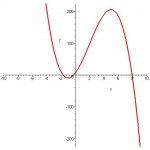Eh. Here's the problem:
"A cubic polynomial is given by f(x)=ax^3+bx^2+30x+k where a, b, and k are constants. The function f(x) has a local minimum at (-1,-10) and a point of inflection at x=2.
a) Find the values of a, b, and k.
b) Use the second derivative to verify that (-1,-10) really is a local minimum for your function.
c) Find the location of any local maximums for your function. Verify that they are indeed a local maximum."
Here's what I've done so far..
I've found the first derivative, f(x)= 3ax^2 + 2bx + 30
and the second derivative, f(x)= 6ax + 2b.
I then plugged the value of x=1 into the first derivative, getting 3a-2b+30.
I also plugged the inflection point of x=2 into the second derivative and got
12a+2b.
From there, I can't seem to remember what to do. Help, please? D:
"A cubic polynomial is given by f(x)=ax^3+bx^2+30x+k where a, b, and k are constants. The function f(x) has a local minimum at (-1,-10) and a point of inflection at x=2.
a) Find the values of a, b, and k.
b) Use the second derivative to verify that (-1,-10) really is a local minimum for your function.
c) Find the location of any local maximums for your function. Verify that they are indeed a local maximum."
Here's what I've done so far..
I've found the first derivative, f(x)= 3ax^2 + 2bx + 30
and the second derivative, f(x)= 6ax + 2b.
I then plugged the value of x=1 into the first derivative, getting 3a-2b+30.
I also plugged the inflection point of x=2 into the second derivative and got
12a+2b.
From there, I can't seem to remember what to do. Help, please? D:

